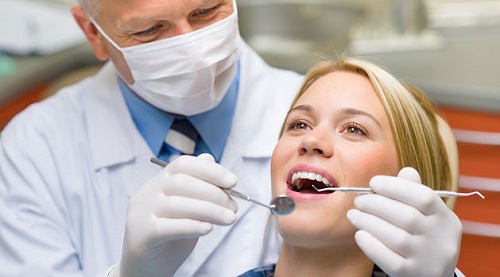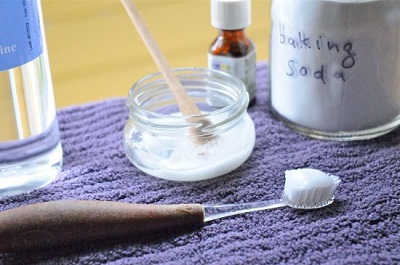Believe it or not, gum recession is quite a common dental condition. However, many people do not realize that their gums are receding when it happens. The gum tissues surround the teeth to keep them in place, but sometimes the margin in these tissues wears away, which in turn exposes a part of or the full tooth including the root. You may also witness gaps between the teeth and gum line as a tooth starts receding which allows disease-causing bacteria to accumulate in those "pockets" and cause infection. Many people always wonder and ask, "Do gums grow back and back to their natural place?" If your gums have receded a lot, you may wonder "can gums grow back in severe cases?"

Do Gums Grow Back?
Some people with receding gum keep asking "do gums grow back?" Actually for those with a minor receding, home remedies will be enough to reverse the situation. However, for severe cases, only a dentist can help bring your gums back to their original form. Actually finding the causes for your receding gums will help you understand your condition and come up with better solutions to grow back your gums. A number of factors can affect your teeth and make gums to recede.
You may witness gum recession due to different periodontal diseases that destroy supporting bone and gum tissue.
Your genes also play a role in making you susceptible to receding gums and other different gum diseases.
Similarly, a change in hormones in women, especially in pregnancy, menopause, and even in puberty, can make them vulnerable to gum recession.
Aggressive tooth brushing, insufficient dental care, and excessive use of tobacco products may also harm your gums severely.
How to Make Gums Grow Back with Home Remedies
Keep Good Oral Hygiene
This cannot get any simpler. Just be sure to use a small-headed, soft toothbrush and avoid being aggressive. Brush at least twice a day, once in the morning and once at night. Using electronic brushes is a good idea to avoid putting too much pressure on your gums. Flossing after every meal is another great way of warding off gingivitis.
The following video will teach you more about improving your oral health:
Eat Nutritious Diet
Include loads of vegetables and fruits in your diet. Opt for fruits rich in Vitamin C and Omega 3s which will help reduce inflammation from gingivitis. You options are kiwi, broccoli, tuna, salmon, orange, lemon, eggs, oysters, kale and so on.
Drink Sufficient Water
Restrict your juice and soda intake and replace it with water. Drink plenty of water every day and rinse your mouth with water after you eat anything. This helps eliminate food particle accumulation and help maintain healthy oral pH levels, which in turn will prevent bacteria from growing.
Use Oil Pulling
This oral therapy may prove beneficial in many cases. This 3,000-year old ayurvedic therapy involves swishing a tablespoon of oil, typically sesame, coconut or sunflower oil, in your mouth for 15-20 minutes and then spitting it out. Oil pulling may also prove beneficial against plaque, gingivitis and microorganisms that cause bad breath.
The following video explains how to use oil pulling and its benefits in more detail:
Try Baking Soda
Baking soda can be an answer to most of your oral diseases. It has the power to neutralize the acids that bacteria require to survive. It may also help improve circulation, prevent decay of tooth and gum and make gums stronger. For maximum benefits, make a mixture of 3 tablespoons of baking soda and 1 teaspoon of water in a cup. While you are stirring, add more water until you get a paste-like substance.
Take some of this mixture onto your finger and rub it gently on your outer gum line. You can place your thumb on the inner gum line and massage in circular motions. After the massage, don't forget to use water or a mouthwash to rinse your mouth completely.
How to Make Gums Grow Back with Medical Treatment
Deep Cleaning
For mild gum recession, your dentist may consider deep cleaning the affected tooth. Also referred to as root planning and tooth scaling, the procedure of deep cleaning involves removing any tarter or plaque accumulated on the teeth. Your dentist will also level the exposed root area to curb bacterial growth.
Pocket Depth Reduction
The procedure involves using specific techniques to fold back the gum tissue that have receded. This gives your dentist a direct access to the pockets which are the ultimate hideouts of all the harmful bacteria. The dentist completes the procedure by carefully securing the gum tissue in its natural position over the root of an affected tooth.
Regeneration of Lost Bone
Sometimes your receding gum destroys or damages the supporting bone, so your dentist may recommend regenerating that lost bone and its supporting tissues. In this regeneration procedure, the dentist applies a graft tissue, membrane, tissue-stimulating protein or other regenerative materials on your affected gum to encourage regeneration.
Soft Tissue Graft
Some people's gums will be naturally thin, which makes them more susceptible to gum recession. If that's the case, your dentist may recommend a soft-tissue graft. There are three different types of soft-tissue grafts--connective-tissue grafts, free gingival grafts and pedicle grafts. And doctors will choose the right one for you. After the surgery, you may experience some pain and discomfort.





View All Comments /Add Comment